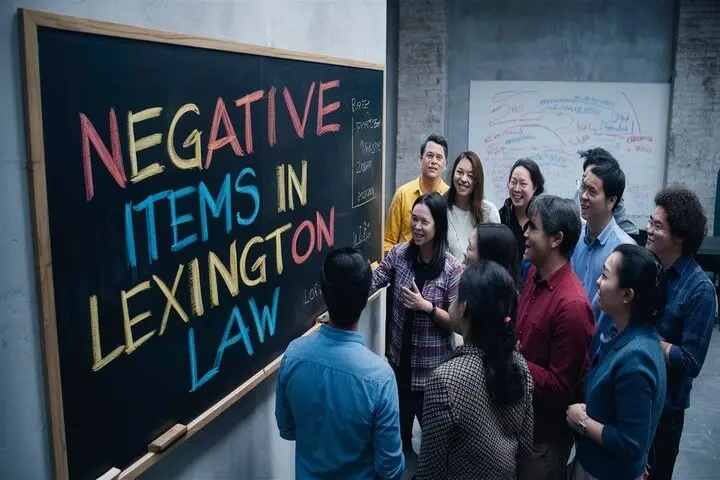
When the credit report contains negative information, this pulls down your credit score and it will be very difficult to get approval for further loans, mortgages, credit cards, and other forms of credit. Lexington Law is one of the most prominent credit repair services, which assists consumers in challenging and eliminating erroneous, unsubstantiated, and irrelevant negative items from credit reports. This article will briefly describe typical unfavorable entries on credit reports and discuss the ways, in which Lexington Law can assist in disputing them.
What are Negative Items?
Negative credit report items is a term that is used to describe any credit report entry that generates a negative image of the creditworthiness of an applicant.
Some examples of negative items include:
- Late payments
- Accounts in collection
- Foreclosures and repossessions
- Bankruptcies
- Tax liens
- Charge-offs
- Public record judgments
Any of these negative items can significantly lower your credit score even with positive things reflecting on your credit report. One more thing, contrary to what many people believe, it only takes one late payment to knock a good credit score by up to 110 points. It is risky to frequently have many negative items on your credit report as this shows high credit risk to the lenders or creditors.
How Long Does It Take For a Debt to Drop Off Your Credit Report?
The Fair Credit Reporting Act determines how long different negative information can legally stay on your credit report:
Holding up payments – 7 years
Since the start of the recession, there has been a significant increase in the number of homes in the United States that have undergone a foreclosure process within the last seven years.
- Bankruptcies: 7-10 years
- Collections - 7 years from the date such account became overdue.
- Charge offs – Seven years
- Civil judgments – 7 years or the governing statute of limitations When the accused is convicted of a crime and receives a civil judgment he/she will be obligated to pay back the amount to the victim for 7 years or the governing statute of limitations whichever period is higher.
- Tax liens – seven years from the date they were filed or until they were paid whichever time is later.
As you can deduce, most of the adverse items can affect your credit and even haunt you for almost a decade. Fortunately, credit repair companies, such as Lexington Law, use special procedures for the disputing of information and can assist in getting the inaccurate, unverifiable, and outdated information in your file erased within these periods.
In this section, we will discuss how Lexington Law challenges credit reports.
Lexington Law is one of the oldest agencies that has been dealing with disputing and deleting negative items on credit reports. They utilize advanced technology and legal tools as part of their dispute process, including:
Automated dispute letters: Dispute letters are written and produced with the help of computer software and concerning every client and the specific credit history as well as negative items. This saves time over drafting manual dispute letters The following are the advantages of using this format:
Negative item validation: Federal law says that the credit bureaus must investigate all the negative information that was challenged by the consumer within 30 days from the date of the receipt of the dispute. If they are unable to corroborate the negative item, it must be deleted from the consumer’s credit report.
Proprietary credit bureau relationships: Since the credit bureaus’ complaints process started, now spanning several decades, Lexington Law has cultivated working contacts with the bureaus’ compliance divisions. This contributes to the easing of a quicker dispute response.
Furthermore, Lexington Law hires professional paralegals as well as attorneys to negotiate on the client’s behalf, especially when replying to more elaborate dispute responses from the credit bureaus. They also negotiate favorable settlements in goodwill with creditors and collections agencies, if necessary, to have adverse accounts settled quickly.
What negative items should you dispute, and what is the procedure for doing so?
Lexington Law recommends disputing negative items that are:
Inaccurate: This includes any information reported with the wrong details, and this may be an account balance with wrong figures, wrong dates of late payments, etc.
Unverifiable: Anything negative that can be proven not to have an explicit link with you and your personality should be contested with the view of having it deleted.
Obsolete: As highlighted before, all negative items have reporting time limits. Certain credit items must be removed from your credit reports once their expiration date elapses and hence cannot legally be included.
Also, note that each of the negative items in your credit report will fade the older they are, meaning that they will not affect your score as much as current negative information. Therefore, challenging recent late payments or collections will result in faster score gains than those items that are over seven years old and will bid farewell to your report in any case.
At Lexington Law, credit repair consultants begin with the assessment of your credit report and the negative entries and seek to identify which of them will be most likely to attract successful challenges.
How does Lexington Law Perform when it comes to the Process of Erasing Bad Debt?
Absolutely, up to this point Lexington Law has assisted more than 500000 clients in credit repair after its establishment in 1991. Engaged clients get an average of 9.6 items that are negatively deleted from their credit report on the Credit Bureaus once in a cycle of disputing.
Most clients of Lexington Law Services begin to record significant changes within the first 3- 6 months, and within this period; the credit score is known to have risen by an average of 56 points. Yes, credit issues differ from one consumer to another, but, the data provided confirm that Lexington Law works very effectively in credit report disputes and deletions.
Obtain Assistance Filing A Complaint Against Negative Credit Report Entries
There is no need to have bad, old, unproven, and false data pull your credit score down any further. One is that Lexington Law has made it easy for one to get experts who work towards the process of removing the negative credit report items as of today. Join us for the free credit consultation today and get to know how you will be improving your credit score this month.
Call now for expert credit repair services: (888) 803-7889
Read More:
What is the fastest way to clean up your credit?
How do I pay off debt if I live paycheck to paycheck?
Does the government have a debt relief program?
Should I pay a 4-year-old charge-off?




